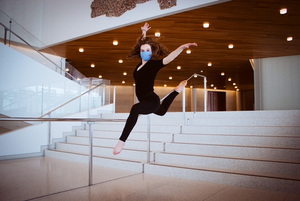Student Blog: To Use the Mirror, or to Not Use the Mirror Part 1
Sabrina Duke debates the use of a mirror during dance technique courses as her and her roommate, Maggie Steimel, reminisce about the last year of mirrorless dancing.

Photo Credit: Alexandra Bush
*Disclaimer: Neither Maggie nor I have ever researched the effect using a mirror has on dancer's technique. The ideas paraphrased down below are purely our opinions and are not backed by scientific research.
Sabrina: I personally like not having a mirror. When I see myself in a mirror, I get super self-critical. I immediately see everything I'm doing wrong and struggle to see everything I'm doing right. I've found not having a mirror has allowed me to do both easier. I recognize "oh, I didn't [fill in the blank], but I did [fill in the blank] well."
Maggie: I should preface this by saying I see the value in not having a mirror, but when you're just using your head, it's easier to concentrate on certain parts of your body and not see the whole picture. When there's a mirror there, it's in the back of my mind. I can say "hey, I'm working on rotating my hips, but if I wanted too, I could lengthen a little more from the top of my head." Through Covid, I haven't had that tool. I understand the whole self-criticism thing, but I want to be able to see the whole picture. Perhaps it's not as useful in a university setting where dance is more about study, but if you're thinking about dance from an entertainment perspective, it's going to be seen, and it helps if you can see what you're doing to know what the audience is looking at.
Sabrina: I agree with that statement 100%. Yesterday, Eloy [Barragan, University of Iowa Associate Professor of Dance] told me "straighten your knee." I couldn't feel my knee because it had gone numb. So, I tried to look at the back of my knee, and I couldn't. I suppose having a mirror in those situations can be helpful, but, if you can feel your body, and you do a turn correctly, since you are not concentrating on the visual and instead on what you felt, it's easier to replicate what you just did because the process of perfecting what you just did is not based on a visual tool; it's based off feeling your body move in space. The process of getting a triple pirouette to become muscle memory is harder because you can only feel what you did, but once it becomes muscle memory, it's deeper in your brain, if that makes sense.
Maggie: That makes sense. As you were talking, I thought of another perspective. Not only are you trying to improve yourself, but we're also on the track to become educators as well, and you cannot go into another body and feel what it is doing. The only way to correct someone is to see it. You need to be able to see the muscles working and to see the placement of the hips correctly to recognize it and realize "that's not correct."
Sabrina: But isn't that why we do combinations in groups...
To Be Continued...

Videos

